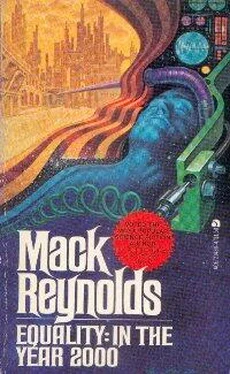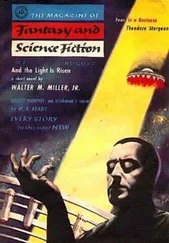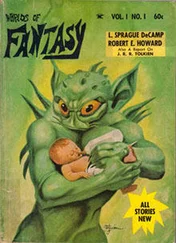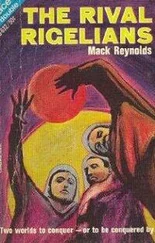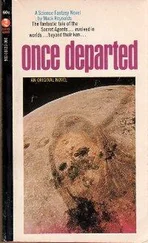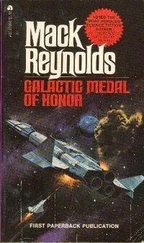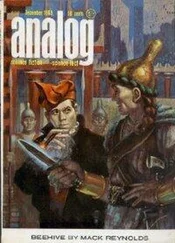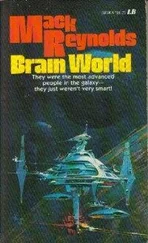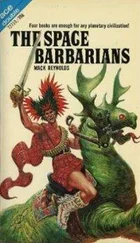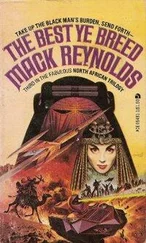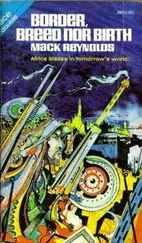Mack Reynolds - Equality - In the Year 2000
Здесь есть возможность читать онлайн «Mack Reynolds - Equality - In the Year 2000» весь текст электронной книги совершенно бесплатно (целиком полную версию без сокращений). В некоторых случаях можно слушать аудио, скачать через торрент в формате fb2 и присутствует краткое содержание. Год выпуска: 1977, ISBN: 1977, Издательство: Ace Books, Жанр: Фантастика и фэнтези, на английском языке. Описание произведения, (предисловие) а так же отзывы посетителей доступны на портале библиотеки ЛибКат.
- Название:Equality: In the Year 2000
- Автор:
- Издательство:Ace Books
- Жанр:
- Год:1977
- ISBN:0-441-21430-4
- Рейтинг книги:3 / 5. Голосов: 1
-
Избранное:Добавить в избранное
- Отзывы:
-
Ваша оценка:
- 60
- 1
- 2
- 3
- 4
- 5
Equality: In the Year 2000: краткое содержание, описание и аннотация
Предлагаем к чтению аннотацию, описание, краткое содержание или предисловие (зависит от того, что написал сам автор книги «Equality: In the Year 2000»). Если вы не нашли необходимую информацию о книге — напишите в комментариях, мы постараемся отыскать её.
Equality: In the Year 2000 — читать онлайн бесплатно полную книгу (весь текст) целиком
Ниже представлен текст книги, разбитый по страницам. Система сохранения места последней прочитанной страницы, позволяет с удобством читать онлайн бесплатно книгу «Equality: In the Year 2000», без необходимости каждый раз заново искать на чём Вы остановились. Поставьте закладку, и сможете в любой момент перейти на страницу, на которой закончили чтение.
Интервал:
Закладка:
“Yes. If you become addicted and wish to be cured, the cure is immediate and you develop a built-in allergy to the drug you were on. Both a physical and a psychological allergy, so that you both don’t want to ever try it again and physically are incapable of standing it.”
Julian sighed. “It was one of the big problems of my time.”
Edith said, “When drugs were first legalized and taken out of the hands of the criminals, they were given quite a go. Then, as with pornography in Denmark, and later in the States, particularly after an extensive educational campaign in the media, use fell off to the vanishing point. I tried smoking opium once, out of sheer curiosity.”
“ You did? You don’t look the type. What happened?”
She was indignant. “But of course I’m the type. I keep telling you that I am an amateur anthropologist. Man has smoked, eaten, and drunk opium for thousands of years.”
“What happened to you?”
“The first time? It made me sick.”
“What do you mean, the first time? What happened the second time?”
“It wasn’t so bad. I had some very nice dreams. I had read up on it, so I knew I had a good chance of becoming ill the first few times I smoked. But I went on and saw it through.”
He shook his head. “It simply doesn’t seem like Edith Leete. Did you finally wind up taking the cure?”
“The cure?”
“For addiction.”
“Oh, Jule. Don’t be ridiculous. I didn’t become addicted. I simply tried it a few times and then stopped. It bored me.”
Julian said, “Okay. Let’s get back to crime. What I want to know is what the hell happened to the criminals when these changes of yours started taking place? What happened to the Mafia, the Syndicate, Cosa Nostra? What did you have to do, shoot them all?”
She rubbed a hand down over her face in a gesture of despair. “Jule, Jule.” Then, “The average criminal in any society is not an affluent man. For every Lucky Luciano—was that his name? It’s been years since I studied it.”
“Yes, Lucky,” Julian said. “As a matter of fact, I met him a couple of times in Naples. Well, it was Capri, actually, just off the coast. He was a rather quiet type. Quite a gentleman, in a way. But there was death behind his eyes.”
“Good heavens, how wonderful,” she said. “For me it’s history. It’s like your telling me you knew, well, Lincoln or General Grant or someone like that.”
Julian said, “My family began its fortune during the Grant administration. There were many opportunities, if you had the connections.”
She said, “At any rate, for every Luciano, Costello, or Capone, there were a thousand petty thieves, dope peddlers, counterfeiters, and so forth whose average take, over the years spent in crime, was less than that of a worker in industry, especially when one considers the years in prison. Let me see if I can remember his name… yes, Willy ‘The Actor’ Sutton, one of the most successful bank robbers. He once figured out that during the forty years in which he had been engaged in crime, or was imprisoned, he had averaged less than two thousand dollars a year in ‘take-home pay.’ Of course, deducted from his gross income were bribes to the police and crooked politicians, lawyers’ fees, exorbitant prices for hideouts, and other professional expenses.”
“What’s your point?”
“You asked what happened to the criminal element when our new Society of the Golden Rule emerged. Certainly, a few Godfathers of the Mafia and such well-to-do criminals opposed the new way of things as strongly as any capitalist. But the overwhelming majority of smaller fry were as much in support of the changes as their more law-abiding citizens.”
Julian slumped back, tossing his notes to the table once again.
“I don’t know,” he said. “I’ve been being very righteous all along here. But the fact of the matter is that when I was the head of West Enterprises, it sometimes became difficult to figure out where honesty ended and crime began. I’ve been hauled into court several times.”
She nodded. “Yes, I know, Jule. Remember, along with my father and mother, I have studied your life just about all my life. I probably know things about you that you don’t…”
He scowled at her. “What’s that supposed to mean?”
She got to her feet and walked over to one of her father’s bookshelves. “Father is one of the last of the book collectors. If he had his way, he’d have a thousand volumes rather than relying on the International Data Banks. Now, where in the devil is the one I want?”
He waited for her to find whatever it was she was looking for. Eventually, she returned.
“Ferdinand Lundberg,” she said.
“I’ll be damned. I know that name. Seems to me he was a professor at one of the big schools. He wrote a couple of muckraker books, as I recall. I don’t think I read them.”
“Yes,” she said grimly. “You with your talk of crime, darling. Listen to this:
“’Most offenses open to members of the upper socioeconomic class… were dealt with by special administrative tribunals. The offenses were mostly variants of fraud or conspiracy. When they were committed against the broad public they called for relatively light penalties, seldom prison terms. Verdicts against the offender were often carefully phrased so as to be non-stigmatic… Even when a member of the upper socioeconomic class was found guilty of a stigmatic crime and was about to be sentenced, there was a marked difference in the language of the judge. Often in the case of a culprit of the lower classes the judge administered a savage tongue-lashing, while the defendant hung his head and his family sobbed, terrorized. But when upper-class culprits had been convicted in criminal court of using the mails to defraud the general public, the judge… typically began by saying: “You are men of affairs, of experience, of refinement and culture, of excellent reputation and standing in the business and social world.” They were in fact, as the judicial process had just disclosed, criminals . This difference in attitude of judges is often pronounced. Severely reprehensive toward members of the lower classes, the judges become wistful, melancholy, or sadly philosophical when sentencing men of the upper class. (After all, they both come from the same class, may have gone to the same school, and may belong to the same clubs.)… Many members of the upper classes did commit offenses for which the government held them accountable. But in most cases special arrangements had been made to handle them with kid gloves and in many cases to administer by way of punishment a slap on the wrist.’”
Julian laughed.
Her eyes narrowed. “What’s funny?”
He rubbed a hand over his chin. “Nothing, really. It’s absolutely true. Actually, I didn’t usually even appear in court. My attorneys represented me. One of the judges I remember was in college with me. We used to call him Fartface.”
“Fartface?”
“One of those taboo four-letter words your father mentioned. At any rate, he was on the take and—”
“On the take?”
“Ummm… that is, he was susceptible to bribery if you handled it in a careful, civilized manner.”
“How in the world did you handle bribery in a careful, civilized manner?”
He looked at her, knowing she wouldn’t understand what he was going to say. “In this particular case I gave his daughter a wedding present… fifty thousand dollars.” He added absently, “Tax free, obviously. Fifty thousand dollars from my account in Switzerland, in thousand-dollar bills.”
She was wide-eyed. “What did you get in return?”
He considered, remembering back down over the years. “Actually, what was involved was one of the smaller countries in Central America.”
Читать дальшеИнтервал:
Закладка:
Похожие книги на «Equality: In the Year 2000»
Представляем Вашему вниманию похожие книги на «Equality: In the Year 2000» списком для выбора. Мы отобрали схожую по названию и смыслу литературу в надежде предоставить читателям больше вариантов отыскать новые, интересные, ещё непрочитанные произведения.
Обсуждение, отзывы о книге «Equality: In the Year 2000» и просто собственные мнения читателей. Оставьте ваши комментарии, напишите, что Вы думаете о произведении, его смысле или главных героях. Укажите что конкретно понравилось, а что нет, и почему Вы так считаете.
